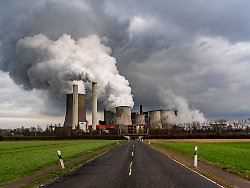Friday, May 7th, 2021
Rising CO2 prices
Coal phase-out should “go massively faster”
Germany intends to say goodbye to coal as an energy source by 2038 at the latest – for reasons of climate protection. But it is possible that the end of the fuel will be sealed earlier – the Ministry of the Environment is now assuming this. The reason is a special kind of price rally.
Due to rising CO2 prices, the Ministry of the Environment expects a much faster phase-out of coal than previously planned. “It has to be assumed that things will go much faster, we can assume that – with a view to the European instrument,” said a spokesman. A significantly increased climate target has been set at the European level, and emissions trading is being reformed.
The capital market, on which CO2 certificates are traded, is clearly taking the plans seriously. “We assume that this price will continue to rise. (…) Then the companies will consider carefully how long it is worthwhile to operate coal-fired power plants,” added the spokesman. The higher the price, the less profitable it becomes to generate energy that is harmful to the climate, for example in coal-fired power plants.
So far, the coal phase-out in Germany is planned by 2038 at the latest. However, the government now wants to achieve climate neutrality by 2045, five years earlier. By 2030, 65 instead of 55 percent fewer greenhouse gases are to be emitted compared to 1990. On Tuesday, the CO2 certificates issued by the EU had passed the 50 euro mark for the first time, marking a record high. The price has thus roughly tripled within a year. Coal-fired power plant operators need a particularly large number of certificates for their production.
Meanwhile, the EU statistical office Eurostat announced that the emission of the greenhouse gas carbon dioxide from the combustion of coal, oil, gas and peat in the European Union in the pandemic year 2020 fell by ten percent according to initial estimates. The development was therefore very different. According to these data, Germany was around minus nine percent. The estimate of the CO2 values from energy use is based on data from EU countries on the consumption of fossil fuels. This depends, among other things, on whether there is a lot of heating required in winter. During the pandemic year, both industrial production and traffic fell sharply at times.
.
